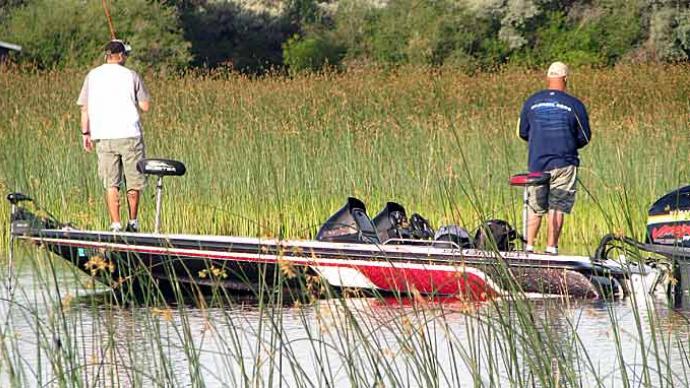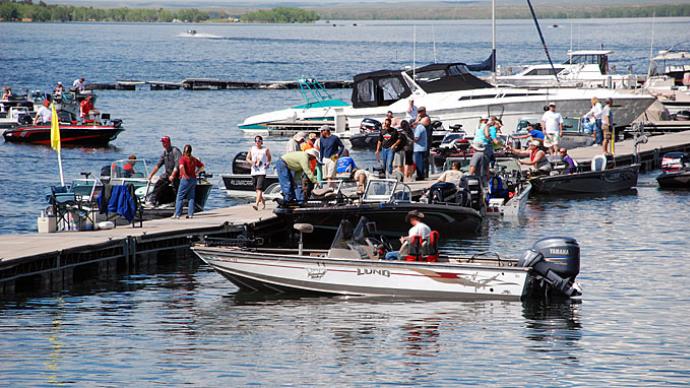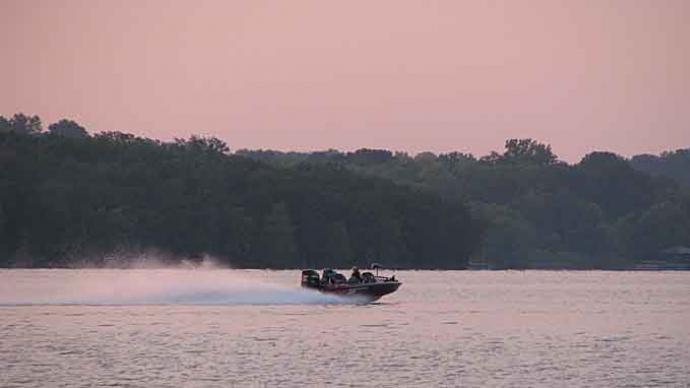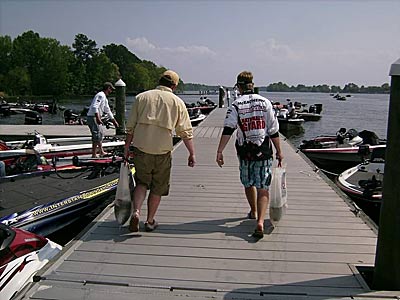
Competition affects relationships between boaters and co-anglers paired in bass tournaments. A lot can happen in the relatively little time between takeoff and check-in. But it doesn’t have to be all bad. As a boater, you choose where to fish. But maybe, more importantly, you need to embrace how you compete.
Some smaller events, such as bass clubs, still rely on the traditional blind draw for tournament pairings. Those anglers, on equal footing in the eyes of the tournament director, decide whose boat they’ll use if they both have one and how they’ll split the day. But that has become a rarity in today’s competitive fishing world. Many clubs, state and regional tournaments, including Bassmaster Opens and FLW’s Toyota Series and BFLs, use a boater and co-angler — sometimes called professional and amateur — format. Anglers register and compete in one of the two divisions, which can carry different rules. The co-angler division, for example, often uses limits with fewer bass. And boaters have use of their rig, total control of its outboard and trolling motor, and choice of fishing spots during competition.
The co-angler fishes from the boat’s back deck and some events have rules about where they can cast. But bottom line, it’s up to them to catch bass wherever their boater decides to fish. While that shift of responsibility is welcomed by most boaters, who almost always pay a higher entry fee for that privilege, it doesn’t mean they should ignore their co-angler.
Boaters who include their partner in the day’s plans, approach, and fishing almost always have a more enjoyable day on the water. If you’re a boater, that effort also will make you more efficient, which translates to better catches. So, a little consideration and inclusion now will pay dividends later.
Discuss the costs
It’s easy to dive head first into the exciting world of competitive bass fishing. Even veteran anglers keep returning for the boat rides, camaraderie, and days on the water. But regardless if you’re a boater or a co-angler, you need a clear understanding of the monetary costs. Travel, entry fees, and gear — you’ll always need the hot lures for the lake you’re fishing next — all add up. And they are paid before you hit the water.
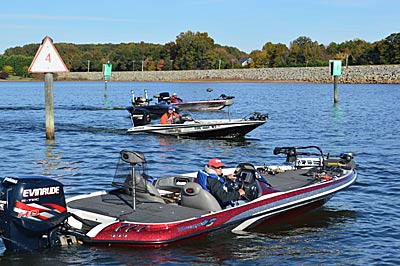
Before the tournament day starts, discuss splitting boat fuel costs and launch fees. Boaters should also give their co-angler an idea of how the day will unfold regarding patterns and spots so they can prepare. Photo by Pete M. Anderson
Boaters accept financial burdens co-anglers never face, such as boat payments, upkeep, and insurance. Most boaters see them as “payment” toward the opportunities of being a boater in tournaments. Choosing where and how you fish is freedom worth investing in.
Those costs are the boater's responsibility, and co-anglers shouldn’t worry about chipping in for them unless they cause damage to the boat. But the expenses associated with the competition day they share, such as boat fuel and launch fees, are fair game.
Money is an uncomfortable topic for many people. So, boaters should get this conversation out of the way, honestly and upfront, as soon as they’re paired with a co-angler. It’s OK to ask for no money — you were going fishing anyways — but sharing expenses, whether 50-50 or another ratio you agree on, is the time-tested and honorable course. Some clubs and organizations set a maximum amount of compensation that co-anglers pay. For example, the first bass club I joined pegged it at $20, but that was many years ago when gasoline was much cheaper.
If you finish high in the boater standings, you may not want any money from your co-angler because of your winnings. Or you may want some alternative form of payment. If you’re meeting at a diner before the tournament, have your co-angler buy breakfast instead of chipping in for gas. You also can have them pay the launch fee, or if you talk in advance, stock the boat’s cooler with ice, drinks, and snacks.
Keep storage open
Eight hours of competition, along with the time waiting for takeoff and loading after check-in, can add up to a long day for you and your co-angler. Making the duration as comfortable as possible for both of you will go a long way toward a better day.
Leave empty the compartment behind the passenger seat. That will give your co-angler storage for foul-weather gear, including the jacket or hoodie coming off as the day warms and a rain suit. A small tackle bag or cooler will fit in there, too.
Getting them off the floor and out of the way significantly benefits them. If you get to the console to turn on a livewell pump, for example, shut off the running lights or move the boat to the next spot, there will be less gear. Stepping over and around gear adds wasted time, subtracting from your fishing efficiency.
If you’re making a long run through potentially rough water, strap your co-angler’s rods to the front deck or put them in the rod locker, especially if there isn’t a dedicated ramp and strap alongside the passenger seat. This may take some preplanning — pulling some of your spare outfits from the boat to make room — but these runs are rarely a last-minute decision.
Rods that aren’t secured can become a distraction in short order. When you hit rough water, and they start bouncing around, your co-angler will instinctively grab them, letting go of handles and forgetting to brace for the next big bounce. That could put them in a position to be hurt, or worse, ejected from your boat. The commotion may become your distraction, too, taking your eyes and attention away from your driving.
Ask for input
Under the traditional blind-draw format, paired anglers would decide how and where they would spend the day because the rules gave each equal time at the trolling motor. Those discussions and decisions are eliminated under today’s most-popular format. But that shouldn’t eliminate discussing your day with your co-angler.
Start by asking your co-angler about their fishing history on the tournament waters. They may be local and have some key insights to share, which would be vital information if you struggled in practice. Or they may have more experience with the current pattern, such as bass schooled in deep water, which could help point you in the right direction.
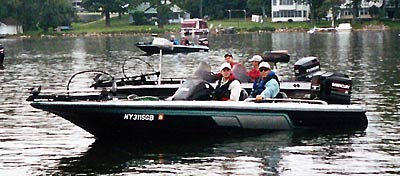
In most tournaments, boaters and co-anglers compete in different divisions and fish spots chosen by the boater. But the best ones still ask their co-angler where and how they think bass will bite. Sometimes that information is key to unlocking a better day for both anglers. Photo by Pete M. Anderson
Most tournaments ban co-anglers from sharing spots they fished with another competitor in practice or during a previous competition day. But an honest boater wouldn’t want that information anyways. The shoe could be on the other foot one day.
Share your plan
Trouble is the only thing you’ll get by not sharing your tournament-day strategy with your co-angler in advance. You don’t have to give up waypoints or specifics; provide an outline of how you plan to fish.
That information allows your co-angler to whittle down his gear to what’s needed to fish your plan. For example, spinning rods and finesse lures can be left on shore if you're punching matted aquatic vegetation all day. And a lighter load means less gear to trip over and maybe a bit more to your boat’s top-end speed.
It also will be easier for your co-angler to anticipate how long it will take for you to announce it is time to move to sitting down and running. Being prompt here saves more time for fishing. “Last cast” when pitching spinnerbaits to docks has an entirely different meaning than when you’re pulling Carolina rigs around a hump.
Give them chances
We’ve all heard the story of a co-angler threatening to send a lure past a boater’s head, sending a message that they are being back seated and need room to fish. Hopefully, most attempts have been limited to threats without action. But not getting a chance to cast can quickly turn-times desperate. And sometimes, those call for desperate measures.
Boaters shouldn’t let a tournament day devolve to that point. While they decide how the day unfolds, they also need to respect the angler in the back of the boat. They are competing, too, and their presence ensures a fair playing field. Most tournament promoters dictate how this should be handled, whether the boater gets the first cast at everything or holds the boat so co-anglers can make casts to them, too.
There are tournament days when both anglers won’t get equal shots at bass, such as when sight fishing is the most productive pattern. On those, many boaters, once they’ve secured their limit, reserve time to help their co-angler catch bass, too. But co-anglers shouldn’t mope and wait for that opportunity. Suggest fan casting the spawning flat or nearby cover or structure to yours. If there are bass spawning, chances are good there are more bass arriving or departing that will run down a moving lure, especially swimbaits.
When it comes down to it, nearly all tournaments that match two anglers in one boat are about having fun on the water and becoming a better angler, not filling your bank account: You only have to compare your tackle shop receipts to your winnings to understand that. And being a better boater goes much further in making that happen.


